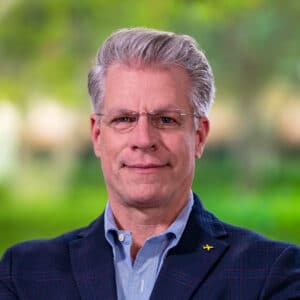|
Getting your Trinity Audio player ready...
|
Spirit Airlines is on the rise—and cybersecurity and information technology leader James Nolin leads the company’s world-class technology plan as chief information security officer.
The carrier has been growing for many years with no signs of slowing down. It all started in 2004, when the Florida-based company bought thirty-five new planes. By 2014, Spirit had cemented itself as a popular low-cost option. With profits up and fuel prices down, leaders introduced twenty-eight new routes. Just three years later, they added twenty-one more destinations. In 2020, Spirit ordered 150 new Airbus jets.
Those working in IT and cybersecurity must embrace change and uncertainty. “It’s important for tech leaders to understand business, create a clear vision, and then be prepared for ambiguity,” Nolin explains.
He knows a thing or two about responding to unexpected events in difficult circumstances. Nolin was in the middle of the Atlantic Ocean preparing to return home from active duty when his Navy captain received an urgent communication. The United States was joining a coalition to occupy an independent island nation near Venezuela. Nolin and his fellow sailors shifted into combat mode and became part of the invasion of Grenada.

Nolin served in the US Navy for eight years, working on gas turbine systems. He intended to pursue a civilian career in mechanical engineering but switched to computer science at the behest of an older brother.
Upon graduation from Jacksonville State University, he earned industry certifications and worked up and down the eastern seaboard first as an information systems manager and later as a senior engineer for GE Capital. As Nolin gained experience, he developed expertise in data networks and security solutions for clients in manufacturing, healthcare, education, government, and transportation.
In 2001, Nolin was sent to help a small Atlanta-based airline called AirTran Airways. The assignment, which was supposed to last just one week, turned into a yearlong contract. When the contract ended, Nolin accepted a full-time position and stayed with AirTrain for more than twelve years. During that time, he led mission-critical IT activities, established a fully integrated call center, led a team that handled all trouble calls from a global company with more than nine thousand employees, and completed an MBA program at the University of Alabama.
By the time Southwest acquired AirTran in 2012, Nolin was ready for a new challenge. He ran IT operations for a few groups in other industries until a former AirTran colleague recruited him to Spirit. He joined in 2016 to eliminate recurring downtimes and ensure system-wide security so the airline could meet its lofty growth targets.
Nolin arrived on-scene as CEO Ben Baldanza was resigning. The board appointed an interim leader and announced plans for CFO Ted Christie to take the number one job two years later. A renewed commitment to growth came with the succession plan and gave Nolin his mandate.
“Our new CEO wanted to prepare for rapid growth, and an airline can’t grow if its IT can’t stand up to growth in terms of people, processes, and applications,” Nolin says. “IT can’t be a roadblock to business.”
“It’s important for tech leaders to understand business, create a clear vision, and then be prepared for ambiguity.”
James Nolin
Spirit, however, had a small and outdated IT environment. Nolin had to consolidate all technologies into a data center, virtualize everything, and rebuild the backend infrastructure to the website to accommodate an expected growth in users and traffic. In his first two years, these measures decreased unplanned system downtime from 3,500 to 100 minutes per month.
Several years ago, Nolin and his teams identified mobility as an emerging trend and knew customers and employees alike would need increased wireless and mobile options. Spirit’s IT team started to move away from large data centers and planned a massive cloud migration so their colleagues could work from anywhere in the world.
Nolin took Spirit to Microsoft Office 365 in 2017 and followed up by rolling out Sharepoint sites and introducing other collaboration tools. The outbreak of COVID-19 delayed the cloud migration project, but with the infrastructure in place, Spirit was able to pivot to a work-from-home model without missing a beat.
While other airlines struggled, Spirit saw limited interruption. Although planes were grounded, training, accounting, marketing, and other business activities continued. When travel bans were lifted, Spirit got back into the sky with relative ease. Now, Nolin says his team has resumed the cloud migration, which he expects to complete by the end of 2021.
The era also gave Nolin a chance to demonstrate his ability to thrive in ambiguity. He helped move training, which was once done in-person, online and is emphasizing security. While a remote workforce brings some advantages and opportunities, IT leaders have less control over how users connect to networks. That means hackers and other bad actors have increased their attempts to break in and deploy ransomware or steal valuable personal information.
“IT can’t be a roadblock to business.”
James Nolin
Nolin previously introduced company-wide quarterly phishing educational resources that took fail rates from 50 percent to .01 percent. Now, his team is further increasing security awareness training and implementing artificial intelligence security tools that pattern normal use cases and identify anomalies.
In the post-COVID era, Spirit is increasing its number of flights and outpacing earnings estimates. Nolin has a strong team in place to help him build and maintain the technology infrastructure that will protect, enable, and “futureproof” the business.
When the pandemic started, Spirit Airlines had 145 jets in the air. That number should grow to nearly 200 this year and to 230 before the end of 2023. From there, the sky’s the limit.
Converge Technology Solutions Corp. is a software-enabled IT & Cloud Solutions provider focused on delivering industry-leading solutions and services. Converge’s regional sales and services organizations deliver advanced analytics, cloud, and cybersecurity offerings. Converge supports these solutions with managed services, digital infrastructure, and talent expertise across all major IT vendors.

